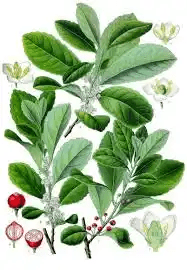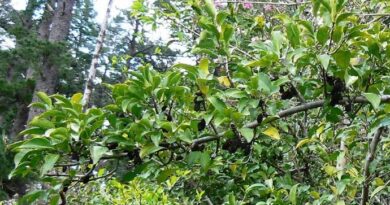14 Medicinal Health Benefits Of Yerba Mate (Ilex paraguariensis)
Yerba mate, derived from the leaves of the Ilex paraguariensis plant, is a traditional South American beverage that holds cultural, social, and medicinal significance. Native to countries like Argentina, Brazil, Paraguay, and Uruguay, yerba mate has gained popularity worldwide for its unique flavor and potential health benefits.
The yerba mate plant is an evergreen tree or shrub known for its glossy, serrated-edged leaves. The beverage, consumed as a tea-like infusion, is prepared by steeping dried leaves and twigs of the plant in hot water. The resulting drink has a distinct herbal taste, often described as earthy, slightly bitter, and with a stimulating effect similar to caffeine.
Traditionally, yerba mate holds a central role in social gatherings in South America, where sharing a gourd or cup of mate is a cultural tradition. It’s often consumed through a metal or wooden straw called a bombilla from a hollowed-out gourd called a mate.
Yerba mate contains various bioactive compounds, including caffeine, theobromine, and antioxidants like polyphenols. Its caffeine content provides a mild stimulant effect, offering a boost in energy and alertness.
However, compared to coffee, yerba mate tends to provide a more gradual and sustained energy increase without the abrupt crash commonly associated with coffee consumption.
Beyond its stimulant properties, yerba mate has been studied for its potential health benefits. It is believed to possess antioxidant properties, aiding in neutralizing free radicals in the body and potentially reducing oxidative stress.
Some research suggests that yerba mate may have anti-inflammatory effects and could support cardiovascular health, although more comprehensive studies are needed to confirm these benefits conclusively.
Yerba mate is also claimed to aid in weight management and digestion, and it’s often used in some traditional herbal medicine practices for its purported diuretic and appetite-suppressing effects. However, scientific evidence supporting these claims is limited and requires further investigation.
While yerba mate is generally considered safe when consumed in moderate amounts, excessive intake or prolonged use might lead to side effects such as insomnia, nervousness, or an upset stomach due to its caffeine content.
As with any herbal remedy or caffeinated beverage, individual responses may vary, and it’s advisable to consume it in moderation, especially for those sensitive to caffeine.
Overall, yerba mate remains an intriguing beverage with a rich cultural heritage and potential health benefits. Its unique flavor profile, social significance, and potential physiological effects continue to captivate interest both within South America and across the globe.
The Botanical Description of Yerba Mate
1. Morphology: Yerba mate, scientifically known as Ilex paraguariensis, is an evergreen tree native to the subtropical regions of South America. It boasts a distinct morphology, featuring glossy, serrated leaves that are elliptical or obovate in shape. The plant can reach heights of up to 15 meters, with a dense canopy providing ample shade.
2. Flowers and Fruits: Yerba mate produces small, greenish-white flowers with four petals, arranged in clusters. These flowers give way to small, red fruits that contain seeds. The fruiting stage is a crucial aspect of the plant’s reproductive cycle, contributing to its overall botanical diversity.
3. Bark and Stem: The bark of yerba mate is smooth, and the stem is often reddish-brown. The combination of these features adds to the plant’s aesthetic appeal. The stem, when mature, develops a woody texture, providing structural support to the plant.
The Geographic Distribution of Yerba Mate
1. Native Regions: Yerba mate is indigenous to the South American countries of Argentina, Paraguay, Uruguay, and Brazil. It thrives in subtropical rainforests and is often found in the understory of diverse ecosystems. Understanding its native regions is crucial for conservation and sustainable harvesting practices.
2. Cultivation Beyond Native Regions: While yerba mate is native to specific regions, it has been successfully cultivated in other parts of the world with suitable climates. Plantations and cultivation efforts extend to regions such as Southeast Asia and Africa, showcasing the adaptability of this plant beyond its original geographic range.
3. Habitat Preferences: Yerba mate demonstrates a preference for well-drained, fertile soils with consistent moisture. It thrives in areas with a combination of sunlight and shade, often growing in the company of taller trees that provide the necessary shade for optimal growth.
The Chemical Composition of Yerba Mate
1. Caffeine Content: Yerba mate is renowned for its caffeine content, making it a popular beverage in South America. The caffeine in yerba mate is accompanied by other xanthines like theobromine and theophylline, contributing to its stimulating effects.
2. Antioxidant Compounds: The leaves of yerba mate are rich in antioxidants, including polyphenols and flavonoids. These compounds play a crucial role in neutralizing free radicals in the body, contributing to overall health and potentially reducing the risk of chronic diseases.
3. Nutritional Elements: Yerba mate contains essential nutrients, including vitamins (such as A, B1, B2, B3, B5, B6, C, and E) and minerals (such as calcium, iron, magnesium, phosphorus, potassium, and zinc). This nutritional profile adds to the plant’s appeal as a health-promoting beverage.
4. Saponins: Yerba mate is a source of saponins, which are bioactive compounds known for their potential health benefits. These compounds may have anti-inflammatory and immune-modulating effects, contributing to the plant’s traditional use in herbal medicine.
5. Polyphenols and Flavonoids: Beyond antioxidants, yerba mate contains specific polyphenols and flavonoids that may have anti-cancer properties and contribute to cardiovascular health. Research is ongoing to explore the full spectrum of health benefits associated with these compounds.
Read Also: The Health Benefits of Using Maggi Masala on your Cooking
The Medicinal Health Benefits Of Yerba Mate (Ilex paraguariensis)

1. Antioxidant Power: Yerba mate is rich in antioxidants, including polyphenols and flavonoids, which help combat oxidative stress and reduce the risk of chronic diseases.
2. Improved Mental Focus: The caffeine content in yerba mate provides a natural boost to alertness and mental focus, making it a popular choice for those seeking cognitive benefits.
3. Enhanced Energy Levels: Yerba mate acts as a natural energizer, providing a sustained release of energy without the jitters often associated with other caffeinated beverages.
4. Digestive Aid: Traditionally used to support digestion, yerba mate may help alleviate digestive issues and promote a healthy gut environment.
5. Immune System Support: The plant’s nutrient profile contributes to immune system health, with vitamins and minerals supporting overall well-being.
6. Anti-Inflammatory Properties: Yerba mate contains compounds with anti-inflammatory effects, potentially assisting in the management of inflammatory conditions.
7. Cardiovascular Health: Research suggests that yerba mate may positively influence cardiovascular health by contributing to healthy blood circulation and cholesterol levels.
8. Weight Management: Some studies indicate that yerba mate may aid in weight management by promoting satiety and boosting metabolism.
9. Anti-Cancer Potential: Certain compounds in yerba mate, such as polyphenols, are being investigated for their potential anti-cancer properties.
10. Stress Reduction: Yerba mate may have adaptogenic properties, helping the body adapt to and cope with stress, potentially promoting mental well-being.
11. Blood Sugar Regulation: Preliminary research suggests that yerba mate may play a role in regulating blood sugar levels, which is beneficial for individuals with diabetes.
12. Respiratory Health: Traditional uses include yerba mate for respiratory health, with potential bronchodilator effects aiding in easier breathing.
13. Anti-Anxiety Effects: Yerba mate may have calming effects, contributing to its traditional use in promoting relaxation and reducing anxiety.
14. Nutrient Boost: Beyond its specific medicinal benefits, yerba mate provides essential nutrients, including vitamins and minerals, contributing to overall nutritional intake.
The Methods of Usage to Achieve the Provided Health Benefits Of Yerba Mate (Ilex paraguariensis)
1. Yerba Mate Tea: The most common method is brewing yerba mate leaves to make a tea. This allows for a convenient and customizable way to consume the plant’s benefits.
2. Yerba Mate Extracts: Extracts in the form of tinctures or liquid concentrates provide a concentrated dose of the plant’s active compounds, allowing for easy incorporation into daily routines.
3. Yerba Mate Capsules: For those who prefer a more standardized dosage, yerba mate is available in capsule or tablet form, providing a convenient option for supplementation.
4. Yerba Mate Infusions: Infusing yerba mate with other herbs or flavors can enhance the taste while maintaining the medicinal properties, offering a variety of options for consumption.
5. Yerba Mate Topical Applications: While less common, some topical products use yerba mate extracts for potential skin benefits, such as reducing inflammation or promoting wound healing.
6. Yerba Mate Culinary Use: Incorporating yerba mate into culinary creations, such as smoothies, soups, or desserts, provides a flavorful way to enjoy its health benefits.
The Side Effects Of Using Yerba Mate Medicinal Plant
1. Caffeine Sensitivity: Yerba mate contains caffeine, and individuals sensitive to caffeine may experience side effects such as insomnia, jitteriness, or increased heart rate.
2. Gastrointestinal Issues: Excessive consumption of yerba mate may lead to digestive issues, including nausea, stomach upset, or diarrhea. Moderation is advised.
3. Interactions with Medications: Yerba mate may interact with certain medications, affecting their efficacy. Consultation with a healthcare professional is recommended, especially for those on prescription drugs.
4. Pregnancy and Breastfeeding Concerns: Due to its caffeine content, pregnant and breastfeeding individuals should exercise caution with yerba mate. High caffeine intake during pregnancy may pose risks.
5. Blood Pressure Concerns: Individuals with high blood pressure should monitor their intake of yerba mate, as caffeine can potentially influence blood pressure levels.
6. Allergic Reactions: While rare, some individuals may be allergic to components in yerba mate, leading to symptoms such as itching, swelling, or difficulty breathing.
7. Bone Health: Excessive consumption of yerba mate has been linked to a potential risk of reduced bone mineral density. Balancing intake with other sources of nutrients is essential.
Read Also: 10 Medicinal Health Benefits Of Verbena officinalis (common vervain)
The Scientific Research and Studies of Yerba Mate

1. Antioxidant Properties: Numerous scientific studies have explored the antioxidant properties of yerba mate. These studies delve into the specific compounds responsible for its ability to neutralize free radicals, contributing to overall health.
2. Caffeine and Mental Performance: Yerba mate’s caffeine content has been a focal point in scientific research, particularly regarding its impact on mental performance. Studies investigate how yerba mate may enhance cognitive functions such as alertness and focus.
3. Anti-Inflammatory Effects: Scientific investigations have explored yerba mate’s potential anti-inflammatory effects. Researchers aim to understand the mechanisms by which the plant may modulate inflammatory responses in the body.
4. Cardiovascular Health: Studies have examined the influence of yerba mate on cardiovascular health, exploring its effects on factors such as blood pressure, cholesterol levels, and overall heart function.
5. Weight Management: Yerba mate’s role in weight management has been a subject of interest. Scientific research investigates its potential to support metabolism and aid in weight loss.
6. Antimicrobial Properties: The antimicrobial properties of yerba mate have been studied, examining its effectiveness against various microorganisms and its potential applications in traditional medicine.
The Safety Precautions and Recommendations In Using Yerba Mate Medicinal Plant
1. Moderation in Consumption: Safety precautions emphasize moderation in yerba mate consumption. Excessive intake, especially over an extended period, may lead to adverse effects such as digestive issues and caffeine-related symptoms.
2. Consideration for Caffeine Sensitivity: Individuals sensitive to caffeine should exercise caution when using yerba mate. Monitoring for signs of caffeine sensitivity, such as insomnia or increased heart rate, is advisable.
3. Interaction with Medications: Yerba mate may interact with certain medications, affecting their absorption or efficacy. It is crucial to consult with a healthcare professional, especially for those on prescription drugs.
4. Pregnancy and Breastfeeding: Due to its caffeine content, pregnant and breastfeeding individuals should limit their consumption of yerba mate to avoid potential risks. High caffeine intake during these periods can impact fetal development.
5. Monitoring Blood Pressure: Yerba mate may influence blood pressure levels. Individuals with hypertension should monitor their intake and consult with healthcare providers to ensure it aligns with their overall health plan.
6. Allergic Reactions: While rare, some individuals may experience allergic reactions to yerba mate. Symptoms may include itching, swelling, or difficulty breathing. Allergic individuals should avoid its usage.
FAQs About Yerba Mate Medicinal Plant
1. Is Yerba Mate Safe for Daily Consumption?
Yerba mate is generally safe for daily consumption when used in moderation. Excessive intake, however, may lead to side effects, so it’s advisable to be mindful of consumption levels.
2. Can Yerba Mate Help with Weight Loss?
Some studies suggest that yerba mate may aid in weight loss by boosting metabolism and promoting satiety. However, it should be part of a balanced lifestyle for effective results.
3. Is Yerba Mate Suitable for Children?
Yerba mate is not recommended for children due to its caffeine content. Pediatric healthcare providers should be consulted before considering its use in children.
4. Does Yerba Mate Interfere with Sleep?
Yerba mate contains caffeine, and excessive consumption, especially close to bedtime, may interfere with sleep. It’s advisable to limit intake in the evening.
5. Can Yerba Mate Be Used During Pregnancy?
Pregnant individuals should limit yerba mate consumption due to its caffeine content. High caffeine intake during pregnancy may pose risks to fetal development.
6. Are There Yerba Mate Products with Reduced Caffeine?
Yes, some yerba mate products offer reduced caffeine options. These can be suitable for individuals looking to enjoy the plant’s benefits with lower caffeine intake.
7. How Does Yerba Mate Compare to Other Caffeinated Beverages?
Yerba mate’s caffeine content is generally lower than coffee but higher than traditional teas. Its unique combination of compounds provides a different caffeine experience.
8. Are There Any Known Allergens in Yerba Mate?
While uncommon, some individuals may be allergic to specific components in yerba mate. Allergic reactions should be monitored, and medical attention sought if necessary.
9. Can Yerba Mate Be Used Topically for Skin Benefits?
Yerba mate is not commonly used topically, and its skin benefits are mainly associated with internal consumption. Topical applications should be approached cautiously.
10. Does Yerba Mate Have Medicinal Uses Beyond Its Traditional Role?
Scientific research is exploring additional medicinal uses for yerba mate beyond its traditional applications, revealing its potential in modern healthcare.
11. Is Yerba Mate Suitable for Individuals with Digestive Issues?
Yerba mate has traditionally been used to support digestion, but individuals with existing digestive issues should monitor their response to its consumption.
12. Can Yerba Mate Be Combined with Other Herbs for Enhanced Benefits?
Yes, yerba mate can be combined with other herbs to create flavorful infusions with potentially enhanced health benefits. Experimenting with different blends is common.
13. Does Yerba Mate Affect Hormonal Balance?
Current research does not indicate significant effects on hormonal balance. However, individuals with specific hormonal concerns should consult with healthcare providers.
14. What Precautions Should Be Taken Regarding Yerba Mate and Blood Pressure Medication?
Yerba mate may influence blood pressure, and individuals on blood pressure medication should consult with healthcare providers to ensure safe and coordinated usage.
15. Can Yerba Mate Be Used in Traditional Medicine Practices?
Yerba mate has a history of use in traditional medicine, and some practitioners may incorporate it into their healing practices. Consultation with experienced herbalists is recommended for proper guidance.
Read Also: Food Contamination/Pollution and Sources of Food Contamination










